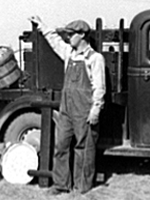
McCaslin, BobAboutMcCaslin describes his work as an agronomist and soil fertility specialist, and projects he has worked on at New Mexico State University.
Abstract
Tape 1, Side A
Bob McCaslin grew up in Wichita, Kan., and worked on his uncle’s farm near Woodward, Okla. His uncle was among many who encouraged him to pursue a career in agriculture. He has a bachelor’s degree in agronomy, and a masters and PhD in agronomy and soil fertility. He began his career in chemistry, but soon realized that he wanted to work in the agricultural field. He has been working with soil fertility issues in one way or the other since he worked on his uncle’s farm. He has always encountered problems with crop growth and plant nutrition. He began working at New Mexico State University as an assistant professor in the Agronomy Department. Although there is always competition for research funding, there is a lot of cooperation between other institutions, industry leaders, and farmers. In total, McCaslin has worked in the soil fertility field for over thirty years; he retired in 2005. While at NMSU, he had three responsibilities as a professor; research, teaching, and service. As a service he was expected to be available to farmers if they had questions or problems. The university has a strong emphasis on research. He was not involved in any patent or copyrighted materials. He describes several projects that he has been involved in and describes the educational requirements needed to be an agronomist.
Tape 1, Side B
McCaslin believes that studies in soil fertility are important, with the major concern being the loss of agricultural land to urbanization. The sixteen classic soil elements are discussed. While it is possible for soil to have everything it needs, it is not very common. As plants take out nutrients that it needs to grow, they must be replaced for the soil to remain fertile. The goal of the soil fertility specialist is to help the farmer get as much crop yield as he can off the land and to be able to do it as economically and environmentally as he can. Farming is a matter of crop versus gain. Crop rotation, organic produce, pesticides, and tests for soil fertility are briefly discussed.
Tape 2, Side A
Soil analysis, plant analysis, visual observations and crop history are ways that the farmer can determine if crop problems are caused by nutrient deficiencies, insects, or disease. Variety problems and planting crops incorrectly can also be factors. McCaslin gives an example of a farmer who had a problem with sudden yellowing of his corn crop. The solution to the problem was discovered by looking at the farmer's nutrient application records. Nutrient balance is critical to crop success. Plowing under a legume crop and manure are sources of soil nutrients in addition to commercial fertilizers. Good soil management, leeching, soil erosion, and water pollution are discussed. McCaslin believes that if this area continues to see increases in population the city will need to consider desalination projects to continue to meet the needs for water. This water, however, would be too expensive for agricultural use and irrigation. McCaslin believes that the time may come when the farmer will be required to follow certain crop sequences, may not have the option to plant whatever he wants, and would be required to grow to prevent starvation as demand dictates.
Tape 2, Side B
In the 1990s McCaslin was approached to work on a collaborative project with the U.S. Navy and TPL, Inc. to see if converted nitrogen from munitions propellant would decompose in the soil. Although environmentally wise to convert and use rather than dump the propellant as waste, the process was too expensive and the idea was scrapped. Other projects he has worked on are discussed. Lack of natural rainfall in the Rio Grande Valley and other areas of arid climate throughout the world produce high amounts of saline in the soil. McCaslin sees the future as having less farm production in the area and/or crops based on varieties that are more drought-hardy. What is needed in our area is "a large quantity of good quality" water. The plant breeding program at NMSU and notable successes such as the Acala 1517 cotton variety, chile, and onions are briefly discussed.
Tape 3, Side A
The impact of general research in agriculture in our country has brought greater insight in the areas of the maintenance and management of fertilization practices, the study of micronutrients, and the use of bio-solids. McCaslin believes that we can help the farmer be more productive economically by keeping water available, developing effective fertilizers, pesticides, and hybrid seeds, and keeping fuel costs down. Supporting legislative action that benefits the farmer is crucial. Farmers need to be able to make a profit in order to survive. Keeping the balance between agricultural output and soil, water, and ecosystem preservation is very important. Imported fruits and vegetables from other countries may continue to increase in the future unless they need to keep more and more for their own use as their populations increase. McCaslin feels that the family farm of the future may not be as diversified as it has been, but that there will still be smaller farms producing more specific or specialized crops. The donation of items to the Museum is discussed.
Tape 3, Side B
The donation of items to the Museum concludes. |

